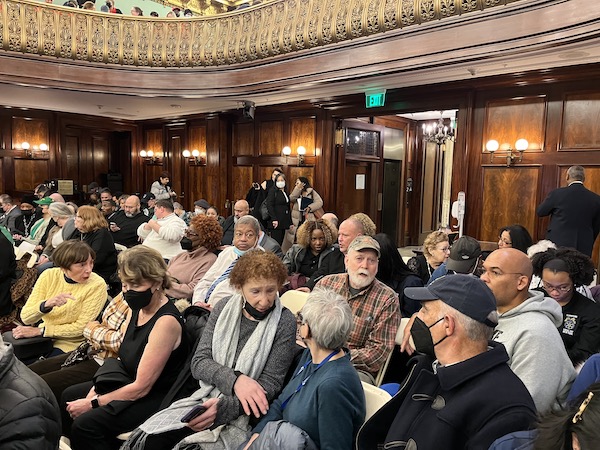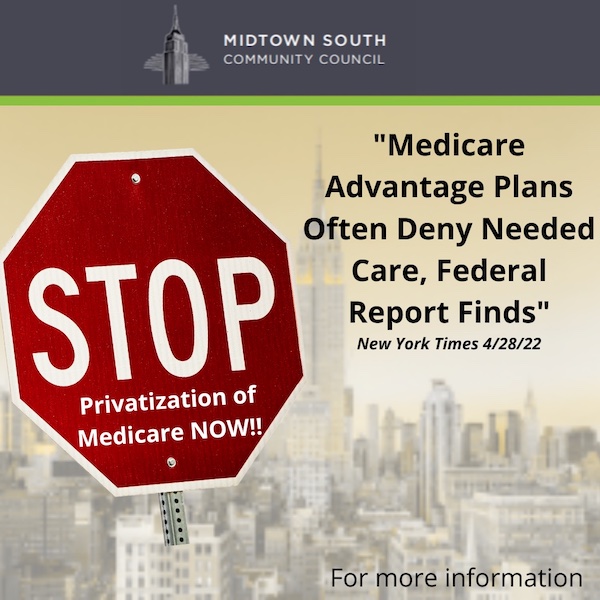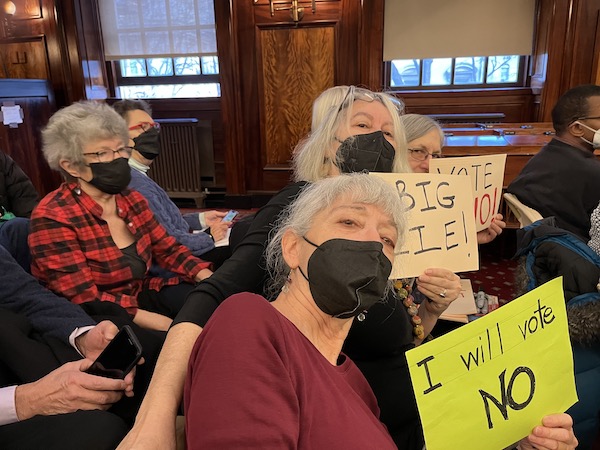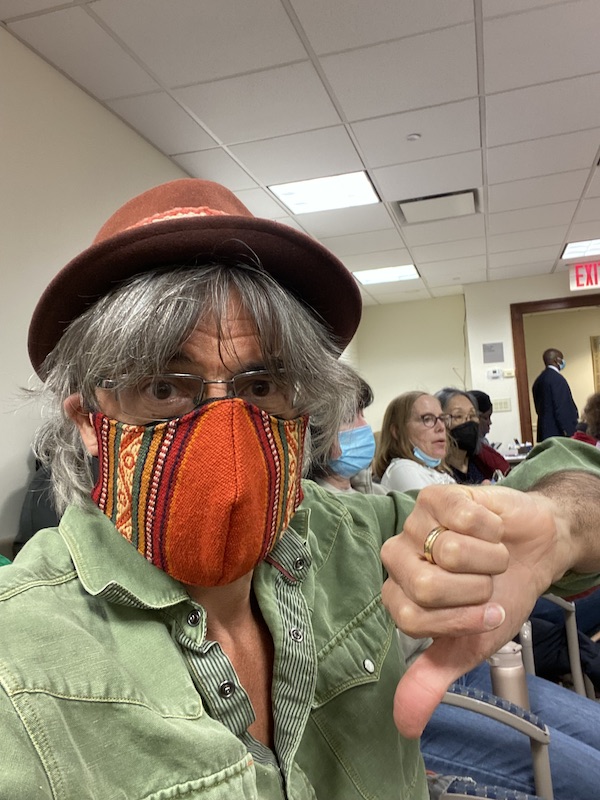
BY JOHN MUDD, PRESIDENT OF MIDTOWN SOUTH COMMUNITY COUNCIL | On Monday, January 9th, 2023, The New York City Council held a hearing to consider legislation amending the administrative code to preserve health care choice for retirees. But amending the code does nothing to preserve choice. The groans and rebuttals from city workers and retirees filling the main floor and balcony said as much (to view the hearing, click here).
My name is John Mudd. I’m with the Midtown South Community Council (MSCC). We’ve been serving the public for 38 years by taking issue with deplorable health, hunger, homelessness, and housing conditions. MSCC joins City workers and retirees in the fight to stop Administrative Code 12-126 from being amended. Doing otherwise will be a threat to their health.
Union leaders gave plenty of reasons for the need to cover rising hospital and drug costs—using words like “ensure,” “preserve,” and “protect” while accusing the retirees of lying; riling the crowd while twisting reality and defending their sinister intent.
Daniel Pollock, The First Deputy Commissioner at The City of New York Office of Labor Relations, was particularly worrisome, declaring, “This isn’t about whether the Advantage plan proceeds, we are planning on moving forward with that plan. We think this amendment is necessary to provide the choices for the retirees.”
UFT President Michael Mulgrew said it’s about a fight for health care costs. Henry Gorrido, Executive Director of District Council 37 (with 150,000 members and nearly 89,000 retirees) and other union representatives said the bill provides choice. An agreeable bunch, they assured us they’ve done everything in their power to work within a system to hold down costs. Gorrido asserted the cost is outpacing the budget, and with no “stabilization” funds available, we’re short $1.8 billion ($600 million annually) to cover the costs of health care. And “We’re going to do everything in our power to serve our members. We’ve got 75% of care given without the need for prior authorization.”
I believe they are earnest in their efforts, but not in prioritizing their retiree’s health. I wouldn’t want to be the 25% having to get an authorization during some medical emergency, and I don’t believe insurers should dictate how doctors should care for the public.
When questioning the union representatives as to why there was so much resistance to changing this code, they gave a host of answers, including: They weren’t allowed to explain the truth of it because former NYC Mayor Bill de Blasio wanted to push it through; Change is hard; Change has to be made; Nobody likes change—and my favorite: They were up against a “cottage industry” focused on how to stop the Medicare Advantage Plan.
NYC Council Member Lincoln Restler said the Union is “doing the best they can in an earnest heartfelt way and we have people who are truly fearful of what this means for their health care,” and what “We’re all struggling with is the inability to communicate to them, that it is not as devastating as they think it is. The crux of the challenge…how can we compromise and work toward a path to negotiate the interests” of the health care industry and force “the compromises necessary to move forward.”

It is known the Mayor is operating aggressively and wants the Council Members’ vote to change the Administrative Code, thereby agreeing to an Advantage Plan, before sharing the contractual agreement with Aetna—the insurer who will benefit from this deal. But why would anyone get behind a mayor who would negotiate with an insurance company when you have the awesome power of 124 unions with a million-plus members collectively? That’s voting power. Now who should dictate the terms to the private, profit-motivated insurance company? Asking what possible motive leads anyone to trade bargaining power and sway the public to accept the terms and conditions from Aetna is merely stating the obvious.
The administrative change will allow the Mayor to sell the care for City workers and retirees to an insurer when things are fairly secure. They’ve avoided the majority of traps and pitfalls the rest of the population may find themselves in with their insurance plans—that is, the social contract they agreed upon, and the city needs to hold up their end. (The grumbling amongst the retirees whose health care is endangered by a pact between the Mayor and Union heads who subordinate themselves to the health care industry continued throughout the meeting.)
“Historically, every other developed nation has achieved universal health care through some form of nonprofit national health insurance. Our failure to do so means that all Americans pay higher health care costs,”—Harvard Gazette, September 2009
And many pay with their lives. One case in point: Bart, a 74-year-old, retired, with an income of $1,000 a month. He’s a quiet man who lives by himself in a rent-controlled apartment one floor below me. Estranged from his brother and two sisters who live in Colorado, he leads a somewhat lonely existence. But it’s a modest life deserving of basic health security.
Bart thought he was going to the hospital for a simple procedure, telling me he’s going to have his aorta replaced. He seemed to have a certain confidence in his medical care. After all, he is covered by an Advantage Plan, and there were a lot of fingers in the pie to give him supplemental support too. There is Northwell, Life Science Implant Card, Meditronics, UnitedHealthcare, Humana, and AARP, which the United Healthcare G-supplemental Plan is purchased through.
Turns out, Bart spent two months in a coma at NYU Langone Hospital on 75th Street, teetering between life and death. Very soon after awakening, the hospital—or my guess, the insurance company—had him hastily shipped to the Regency Nursing Home in Yonkers for rehab. Not surprisingly, no sooner than he arrived at the Regency he was rushed to a nearby hospital for a week or so before being returned to Regency Nursing Home once more.
Bart’s been in a dark place ever since. He’s confused and unsure of how he ended up in a hospital in Yonkers. What bestowed him this service was the gap between expenses and profits. Was there a better supplemental insurance to give him better care? Working in the now to protect Bart from being buried in debt, I took a crash course of the various confusing Medicare plans: the A, B, C, D, E, F, G. The multiple plans with multiple coverage, seems like a useful way for insurance companies to avoid paying. You know, like when you purchase flood insurance, but your insurance won’t pay because it came from a backed-up sewage drain caused by a storm and not the tidal wave.
And because of Bart’s complicated care and required daily dialysis, his insurance ended. His sister, who is less estranged now because of Bart’s health crisis, has helped to secure better insurance coverage: The supplemental G plan, so that his medical bills would be paid and his care would continue. As of January 1, 2023, United Healthcare Supplemental Plan started withdrawing $278.25 a month from Bart’s bank account. And there are limits to how long they’ll pay that I have yet to sort out.
Bart’s total income for the year puts him below the poverty line. His rent is a modest $700, plus the $278.25 for insurance…add phone, electric, and gas…and how will he eat? Unfortunately, Bart is not the only one. There are a lot of elderly people in the city who are equally cost-burdened.

We’re in a critical point in time, where suffering is at an all-time high. It’s clear who’s responsible for destabilizing an important pillar of our society. They’ve stolen the Medicare name to entice people into an “Advantage Plan”—a misnomer that strips away care and adds to their own bottom line. Resolving the issues of rising costs and broken systems of health requires a little more thinking than extracting the health and wealth from the backs of the City workers, retirees, and aging Medicare recipients and giving it to the private profit system of care.
The testimonies throughout the hearing were overwhelming. They provided nuance and options to explore. The abundance of fresh ideas presented could be harnessed not only to find solutions for funding, but to decrease costs, and improve oversight and administration for more efficient delivery of care.
Health expert and activist Wendell Potter suggests several solutions, such as the “Participant Eligibility Audit” to uncover “payment for care that was never delivered–and also approving wildly inflated claims. The audits could sniff out erroneous payouts.
Sue Ellen Dodell’s testimonial recommends several solutions, including, “competitive bids for the Senior Care Medicare Supplemental plan…consolidation of the MLC’s welfare funds for increased purchasing power and reduced administrative costs,” and review of “the last three years of Emblem’s annual “Statement of Experience” which details members’ usage of the GHI-CBP plan – the City has refused to share them despite our FOIL requests.”
Sarah Shapiro, retired teacher and member of CROC (Cross-union Retirees Organizing Committee), says, “The city could create a self-insurance plan. These testimonials, along with others submitted throughout the night and uploaded to the NYC Council’s website separate fact from fiction and offer alternative solutions and a pathway forward.
We ask you to stop those who drive disparity and trade lives for profits. We ask you to secure health for dignity’s sake and for future generations. The people need a health plan, unencumbered and equally dispensed, to ameliorate the health crisis, not an unimaginative wealth extraction plan. We’re asking you to work with us for a greater analysis of the crisis, safeguard what is, and build a system of care and security for the future.

Chelsea Community News is an independent, hyperlocal news, arts, events, info, and opinion website made possible with the help of our awesome advertisers and the support of our readers. Our Promise: Never a paywall, no pop-up ads, all content is FREE. With that in mind, if circumstances allow, please consider taking part in our GoFundMe campaign (click here). To make a direct donation, give feedback, send a Letter to the Editor, or contact our founder/editor, send an email to Scott Stiffler, via scott@chelseacommunitynews.com.
To join our subscriber list, click here. It’s a free service provding regular (weekly, at least) Enewsletters containing links to recently published content. Subscribers also will be sent email with “Sponsored Content” in the subject line. That means it’s an exclusive message from one of our advertisers, whose support, like yours, allows us to offer all content free of charge.

Pingback: Guest Opinion: Why Protecting Traditional Medicare is Important to Us All | MIDTOWN SOUTH COMMUNITY COUNCIL